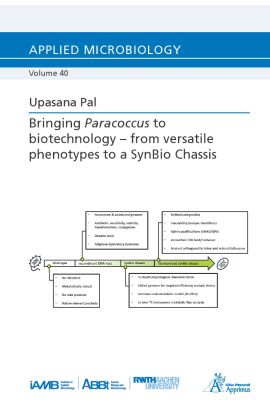The pressing issues of the 21st century expose the unsustainability of the linear economy, emphasizing the need for a circular bioeconomy where resources are continually reused and repurposed to minimize waste and promote ecological sustainability. One promising solution within the circular bioeconomy is the development of microbial chassis strains, that are metabolically robust and can be harnessed to aid the circular bioeconomy goals of upcycling waste materials into value-added products. This Ph.D. research focuses on developing a novel microbial chassis from the genus Paracoccus, known for its metabolic robustness for being osmo- and thermo-tolerant, consuming cheap and renewable sources and native producers of bioplastics polyhydroxyalkanoates.
The first part of this study includes the development of a robust genetic toolbox with many bio-parts for tailored genetic engineering of the novel chassis with a focus on PET monomer utilization thereby contributing to a circular bioeconomy. The second part of this study dwells on the whole genome sequencing of Paracoccus strains, conducting phylogenetic analysis, and finally resulting in the reclassification of uncharacterized strains, thereby expanding knowledge regarding this genus. Whereas the last section of this study focuses on a dual approach involving understanding the metabolism of the novel SynBio chassis, P. pantotrophus DSM 2944 comprising an in-vivo 13C-based MFA coupled with the curation of a genome-scale model of the novel SynBio chassis (iPpan24). The MFA highlighted how this novel chassis preferred the ED pathway over EMP pathways for glucose metabolism, indicating efficient protein allocation, and the newly curated GEM was utilized to predict yields of biotechnologically relevant products and open doors to future model-guided rational strain engineering for efficient bioprocesses. In summary, a significant process was made to develop a novel microbial chassis from the genus Paracoccus, to contribute towards sustainable bio-economy goals of the future.
| Autor | Pal, Upasana |
|---|---|
| Gewicht | 0.329 kg |
| Erscheinungsdatum | 02.06.2025 |
Institut für Angewandte Mikrobiologie (iAMB)
Bringing Paracoccus to biotechnology – from versatile phenotypes to a SynBio Chassis
Kurzbeschreibung
A novel microbial chassis from Paracoccus spp. was developed to support circular bioeconomy goals. A genetic toolbox enabling PET monomer utilization was constructed. Whole-genome sequencing led to reclassification of uncharacterized strains. Metabolic flux analysis and a curated genome-scale model (iPpan24) revealed ED pathway preference and predicted product yields, enabling model-guided strain engineering.

